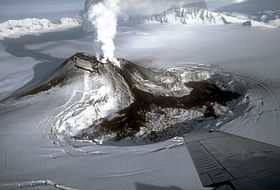Veniaminof
| Mount Veniaminof | |
|---|---|

Steam rising from the intracaldera cinder cone at Veniaminof volcano in the waning stages of the 1983 to 1984 eruption.
|
|
| Highest point | |
| Elevation | 8,225 ft (2,507 m) |
| Prominence | 8,199 ft (2,499 m) |
| Listing | |
| Coordinates | 56°11′53″N 159°23′27″W / 56.19806°N 159.39083°WCoordinates: 56°11′53″N 159°23′27″W / 56.19806°N 159.39083°W |
| Geography | |
|
|
|
| Parent range | Aleutian Range |
| Topo map | USGS Chignik A-5 |
| Geology | |
| Mountain type | Stratovolcano with a summit caldera |
| Volcanic arc/belt | Aleutian Arc |
| Last eruption | June to October 2013 |
| Designated | 1967 |
Mount Veniaminof is an active stratovolcano located on the Alaska Peninsula. The Alaska Volcano Observatory currently rates Veniaminof as Aviation Color Code YELLOW and Volcano Alert Level ADVISORY as of October 1, 2015, 2000 (UTC) following observations of elevated seismicity. The mountain was named after Ioann (Ivan Popov) Veniaminov (1797–1879), a Russian Orthodox missionary priest (and later a prominent bishop in Russia) whose writings on the Aleut language and ethnology are still standard references. He is a saint of the Orthodox Church, known as Saint Innocent for the monastic name he used in later life.
The volcano was the site of a colossal (VEI 6) eruption around 1750 BC. This eruption left a large caldera. In modern times the volcano has had numerous small eruptions (over ten of them since 1930); these are located at a cinder cone in the middle of the caldera.
Veniaminof has one of the highest elevations of Alaskan volcanoes. Partly for this reason, it is covered by a glacier that fills most of the caldera. Because of the glacier and the caldera walls, there is the possibility of a major flood from a future glacier run.
...
Wikipedia

